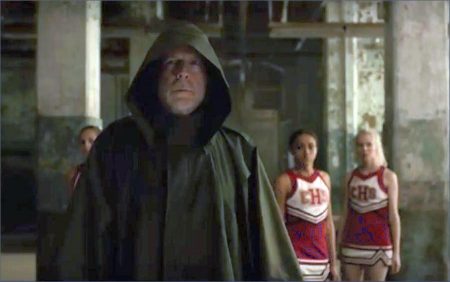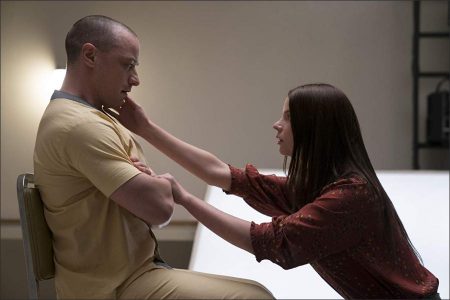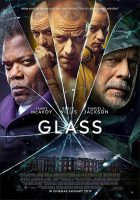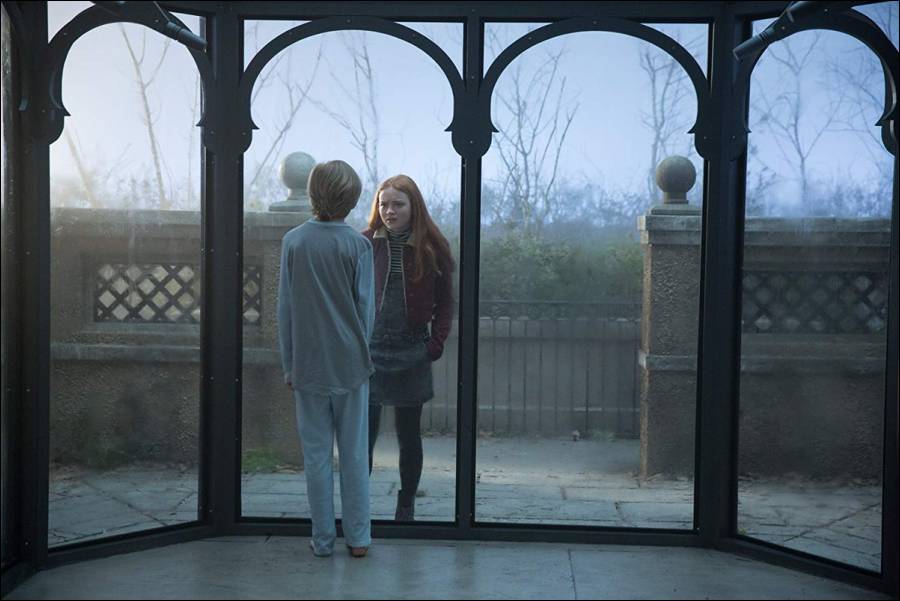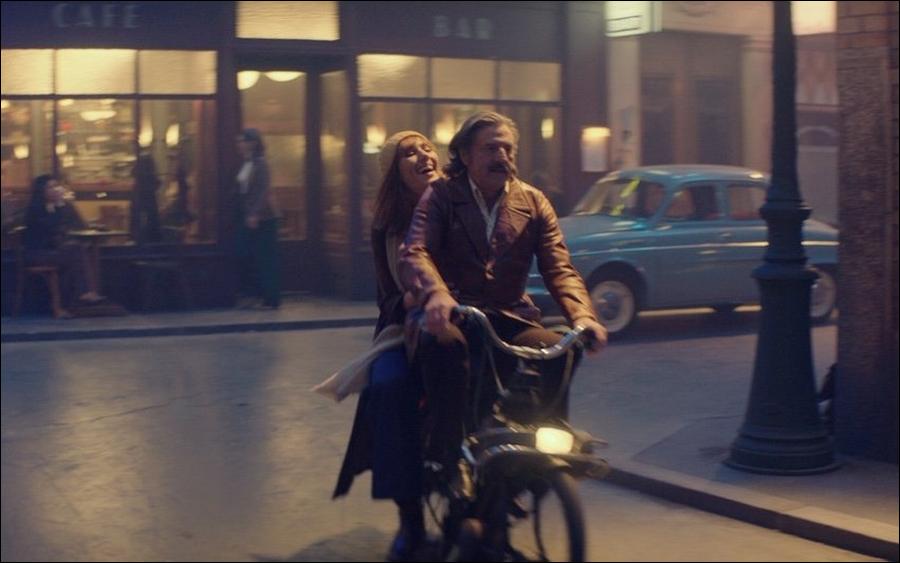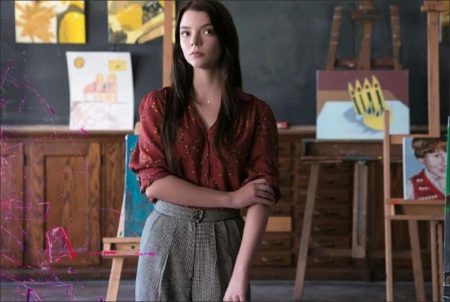
Taglines: You cannot contain what you are.
Three weeks after the events of Split, David Dunn, working with his now-adult son Joseph, has been using his superhuman abilities to protect people from criminals under a new alias known as “The Overseer.” David and Joseph are currently fixated on pursuing Kevin Wendell Crumb, who suffers from dissociative identity disorder, which provides his moniker “The Horde.” Joseph narrows down Kevin’s location, and David discovers where he is currently operating by intentionally seeking him out and casually touching his nine year old identity, “Hedwig.”
Nearly two long decades after the life-altering events in Unbreakable (2000) and the grotesque emergence of the powerful “Beast” persona in Split (2016), the now-grizzled avenger of the innocent–David Dunn, or “The Overseer”–still tries to track down the Horde and the elusive kidnapper, Kevin Wendell Crumb.
However, a mysterious new adversary in the person of the determined and silver-tongued psychiatrist, Dr Ellie Staple, has made it her mission to convince David, Kevin, and Raven Hill Memorial’s wheel-bound brittle-boned inmate, Elijah Price, that the delusional super-humans are, in fact, mere mortals. Now, the stage seems set for the ultimate revelation, against the backdrop of an imminent deadly confrontation. Is there a moment of life beyond what fate has predestined?
Glass is a 2019 American psychological superhero thriller film[6] written and directed by M. Night Shyamalan, who also produced with Jason Blum, Marc Bienstock, and Ashwin Rajan. The film is a crossover and sequel to Shyamalan’s previous films Unbreakable (2000) and Split (2016) and the third and final installment in the Unbreakable trilogy a.k.a. Eastrail 177 Trilogy[7] Bruce Willis, Samuel L. Jackson, Spencer Treat Clark, and Charlayne Woodard reprise their Unbreakable roles, while James McAvoy and Anya Taylor-Joy return as their Split characters,[8] with Sarah Paulson, Adam David Thompson, and Luke Kirby joining the cast.
Despite interest in a sequel, Touchstone Pictures opted not to finance one. Shyamalan set out to write Split using a character he had written for Unbreakable but pulled from its script due to balance issues. Shyamalan realized the opportunity he had to create a trilogy of works, and used the ending of Split to establish the film as within the Unbreakable narrative. This included securing the rights to use Willis’s Unbreakable character from Walt Disney Studios, with the promise of including Disney within the production and distribution of this third film alongside Universal Pictures. Split was a financial and critical success, and by April 2017, Shyamalan announced that he started the production process for Glass.
The film had its world premiere at Alamo Drafthouse Cinema on January 12, 2019 and was released in the United States on January 18, 2019, by Universal Pictures. Glass received “generally unfavorable reviews” from critics, who found the film “disappointing” and “underwhelming”. Nevertheless, the film was a financial success as it grossed $247 million worldwide against a $20 million production budget.
Film Review for Glass
More “Split 2” than “Unbreakable 2,” M. Night Shyamalan has finally produced his first direct sequel, the mash-up that is “Glass,” bringing together characters from two of his biggest hits. As the end of “Split” hinted, that film took place in the same universe as Shyamalan’s 2000 film “Unbreakable,” still his best work to date. The promise of the coda to “Split” is fulfilled in “Glass,” bringing together Shyamalan’s vision of the Freudian brain in the uncontrolled id of DID-afflicted Kevin Crumb (James McAvoy), the regulating force of the super-ego in David Dunn (Bruce Willis), and the moderator between the hero and the villain in the ego that is Elijah Price aka Mr. Glass (Samuel L. Jackson).
Once again, Shyamalan is playing with comic book tropes, adding his twists to monologuing heroes and villains who are remarkably self-aware of their own genre arcs. There’s a truly ambitious film buried in “Glass,” and I do mean buried. The problem is that Shyamalan can’t find the story, allowing his narrative to meander, never gaining the momentum it needs to work. Say what you will about “Unbreakable” and even “Split,” they had a propulsive energy that’s lacking here, at least partially because any sense of relatability is gone. “Glass” is a misfire, and it’s the kind of depressing misfire that hurts even more given what it could have been.
“Unbreakable” and “Split” have protagonists thrust into life-changing situations. The former told the story of David Dunn, the only survivor of a horrible train crash, who learned that he was more than human. The latter tells two stories—that of a girl, Casey (Anya Taylor-Joy, who returns here and is given woefully little to do), forced to discover her own strengths, and that of a mentally ill patient who may be more than your average person diagnosed with DID.
As “Glass” opens, we know David Dunn, now known in Philadelphia as the mysterious protector called the Overseer and working with his son (Spencer Treat Clark), is a superhero. And we know Kevin Crumb has a personality called The Beast that can climb walls and take shotgun blasts. And yet so much of “Glass” is devoted to trying to convince David and Kevin that they are not super in any way.
In the pursuit of another twist ending, Shyamalan takes a narrative step back, covering so much of the same ground that the two previous films did instead of carving a new path. He’s so obsessed with ending on a gotcha note that he delays any sort of narrative interest until then, basically forcing his audience to tread water until that point. Think long and hard about what you know at the end of “Glass” as opposed to what you knew at the beginning and you’ll realize how hollow this whole venture has been.
Most of “Glass” takes place at Raven Hill Memorial Psychiatric Hospital. In what could be called the prologue, David/Overseer tracks Kevin/Horde down after the villainous man with multiple personalities kidnaps four young women, holding them in an abandoned factory. The two men fight, and one immediately gets the sense that something is not quite right.
This showdown between two of the most memorable characters in Shyamalan’s history lacks the punch or creative fight choreography fans should expect. The pair head out a window and into the arms of Dr. Ellie Staple (Sarah Paulson), the confident doctor who shuttles them off to the same psych ward that’s been housing Mr. Glass for almost two decades. Glass is kept in a deeply vegetative state in a room in the same wing as David and Kevin. Dr. Staple tries to convince all three that they are not really super in any way. David’s strength isn’t that abnormal and Kevin’s powers as The Beast could be explained away.
In the midsection of “Glass,” Shyamalan hits every beat more than once, almost joylessly. Paulson gives the same speech multiple times, and a bit with a bright light that can change which personality of Kevin’s dominates goes on forever … and then happens again. Shyamalan is determined to cycle through the back stories of these characters, even employing footage from “Unbreakable” and “Split” in flashbacks as if he doesn’t realize that 95% of viewers have seen them.
He seems so intent on the reveals of his final fifteen minutes that he forgets to take opportunities to make the nearly two hours before that interesting. Why is Raven Hill such a dull bore to look at? Why is Shyamalan determined to make another film about whether or not superheroes are superheroes instead of just building on the foundation he’s created? Imagine “The Avengers” retelling all the origin stories and then questioning whether or not The Hulk is really a superhero or just an angry dude.
Glass (2019)
Directed by: M. Night Shyamalan
Starring: James McAvoy, Bruce Willis, Samuel L. Jackson, Anya Taylor-Joy, Sarah Paulson, Charlayne Woodard, Luke Kirby, Shannon Destiny Ryan, Diana Silvers, Serge Didenko, Nina Wisner
Screenplay by: M. Night Shyamalan
Production Design by: Chris Trujillo
Cinematography by: Mike Gioulakis
Film Editing by: Luke Ciarrocchi, Blu Murray
Costume Design by: Paco Delgado
Set Decoration by: Olivia Peebles
Art Direction by: Jesse Rosenthal
Music by: West Dylan Thordson
MPAA Rating: PG for violence including some bloody images, thematic elements, and language.
Distributed by: Universal Pictures
Release Date: January 18, 2019
Visits: 26
